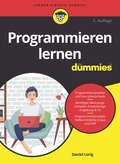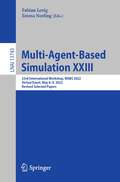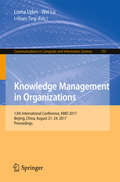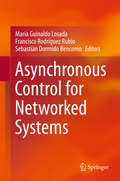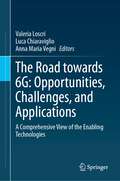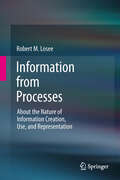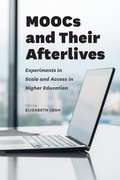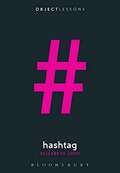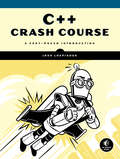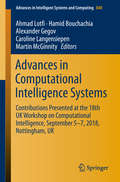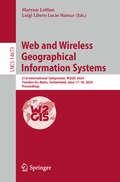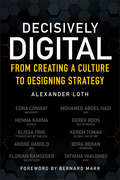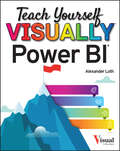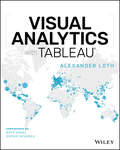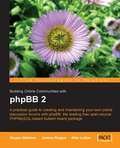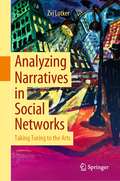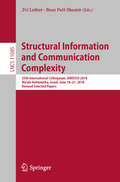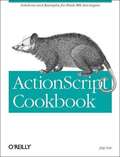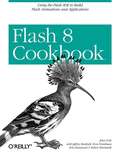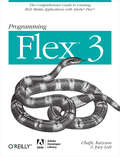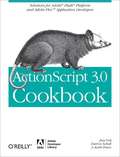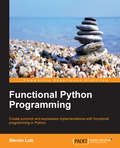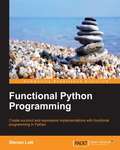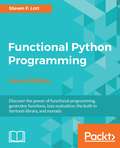- Table View
- List View
Programmieren lernen für Dummies (Für Dummies)
by Daniel LorigHaben Sie auch schon mal den Wunsch verspürt, programmieren zu können? Oder wenigstens zu verstehen, wie Computer ticken, die unser Leben bestimmen? Dieses Buch führt in die Denkweise von Programmierern und die Funktionsweise von Programmen ein und zeigt Ihnen, worauf Sie beim Programmieren achten müssen: Geben Sie eindeutige Anweisungen, sichern Sie sich immer gegen alle Eventualitäten ab und kommen Sie mit den gegebenen, beschränkten Mitteln aus. Gut, dass der Computer wenigstens nicht murrt, wenn er monotone Tätigkeiten ausführen muss! Am Ende des Buches angelangt, haben Sie einen wichtigen Ausschnitt unserer Welt besser kennen gelernt und Einblicke in allgemeine Programmierkonzepte und zwei Programmiersprachen erhalten. Dann sind Sie in der Lage, fundiert zu entscheiden, ob und wie Sie Ihr Wissen weiter vertiefen wollen.
Multi-Agent-Based Simulation XXIII: 23rd International Workshop, MABS 2022, Virtual Event, May 8–9, 2022, Revised Selected Papers (Lecture Notes in Computer Science #13743)
by Fabian Lorig Emma NorlingThis book constitutes the thoroughly refereed and revised selected papers from the 22nd International Workshop on Multi-Agent-Based Simulation, MABS 2022, which took place virtually during May 8–9, 2022. The conference was originally planned to take place in Auckland, New Zealand, but had to change to an online format due to the COVID-19 pandemic.The 11 papers included in these proceedings were carefully reviewed and selected from 17 submissions. They focus on finding efficient solutions to model complex social systems, in areas such as economics, management, organisational and social sciences in general.
Knowledge Management in Organizations: 12th International Conference, KMO 2017, Beijing, China, August 21-24, 2017, Proceedings (Communications in Computer and Information Science #731)
by Lorna Uden, Wei Lu and I-Hsien TingThis book contains the refereed proceedings of the 12th International Conference on Knowledge Management in Organizations, KMO 2017, held in Beijing, China, in August 2017. The theme of the conference was "Emerging Technology and Knowledge Management in Organizations." The 45 contributions accepted for KMO 2017 were selected from 112 submissions and are organized in topical sections on: Knowledge Management Models and Behaviour Studies; Knowledge Sharing; Knowledge Transfer and Learning; Knowledge and Service Innovation; Knowledge and Organization; Information Systems Research; Value Chain and Supply Chain; Knowledge Re-presentation and Reasoning; Data Mining and Intelligent Science; Big Data Management; Internet of Things and Network.
Asynchronous Control for Networked Systems
by María Guinaldo Losada Francisco Rodríguez Rubio Sebastián Dormido BencomoThis book sheds light on networked control systems; it describes different techniques for asynchronous control, moving away from the periodic actions of classical control, replacing them with state-based decisions and reducing the frequency with which communication between subsystems is required. The text focuses specially on event-based control. Split into two parts, Asynchronous Control for Networked Systems begins by addressing the problems of single-loop networked control systems, laying out various solutions which include two alternative model-based control schemes (anticipatory and predictive) and the use of H2/H∞ robust control to deal with network delays and packet losses. Results on self-triggering and send-on-delta sampling are presented to reduce the need for feedback in the loop. In Part II, the authors present solutions for distributed estimation and control. They deal first with reliable networks and then extend their results to scenarios in which delays and packet losses may occur. The novel results presented in Asynchronous Control for Networked Systems are transmitted in a concise and clear style supported by simulation and experimental examples. Some applications are also provided. Academic researchers and graduate students investigating control theory, control engineering and computer communications systems can use this monograph to learn how asynchronous control helps tackle the problems of networked systems in centralized and distributed schemes. Control practitioners at work in power systems, vehicle coordination and traffic networks will also find this book helpful in improving the performance of their systems.
The Road towards 6G: A Comprehensive View of the Enabling Technologies
by Valeria Loscri Luca Chiaraviglio Anna Maria VegniThe proposed book will provide a comprehensive picture of the journey from 5G networks towards 6G. Different aspects, ranging from theoretical foundations to existing platforms and technologies will be presented and analysed, by critically highlighting the real opportunities and the challenges. The first chapters are to describe the general “transitioning” aspects from 5G to 6G. After that, an overview on the different technologies is provided, to present at the end the security aspects, the new applications and an analysis of the electromagnetic exposure, above all in terms of comparative in respect of 5G. Security and Application will be straightforward better explained after the big picture on the different technologies is detailed in the previous chapters. 6G is an emerging complex paradigm, with some important new concepts, that would enable an extremely high reliability and low latency. The main purpose is to provide the reader a thorough vision of the enabling technologies, their potential and what is still needed to fill the gap in terms of sustainability and coexistence of the different technologies. Since different emerging technologies will be considered and detailed in the book, it will be interesting for the reader to infer the major opportunities of each and the main limitations. This kind of information will mainly boost the potential interactions of different technologies to provide a more reliable system.
Information from Processes
by Robert M. LoseeInformation is an important concept that is studied extensively across a range of disciplines, from the physical sciences to genetics to psychology to epistemology. Information continues to increase in importance, and the present age has been referred to as the "Information Age." One may understand information in a variety of ways. For some, information is found in facts that were previously unknown. For others, a fact must have some economic value to be considered information. Other people emphasize the movement through a communication channel from one location to another when describing information. In all of these instances, information is the set of characteristics of the output of a process. Yet Information has seldom been studied in a consistent way across different disciplines. Information from Processes provides a discipline-independent and precise presentation of both information and computing processes. Information concepts and phenomena are examined in an effort to understand them, given a hierarchy of information processes, where one process uses others. Research about processes and computing is applied to answer the question of what information can and cannot be produced, and to determine the nature of this information (theoretical information science). The book also presents some of the basic processes that are used in specific domains (applied information science), such as those that generate information in areas like reasoning, the evolution of informative systems, cryptography, knowledge, natural language, and the economic value of information. Written for researchers and graduate students in information science and related fields, Information from Processes details a unique information model independent from other concepts in computer or archival science, which is thus applicable to a wide range of domains. Combining theoretical and empirical methods as well as psychological, mathematical, philosophical, and economic techniques, Losee's book delivers a solid basis and starting point for future discussions and research about the creation and use of information.
MOOCs and Their Afterlives: Experiments in Scale and Access in Higher Education
by Elizabeth LoshA trio of headlines in the Chronicle of Higher Education seem to say it all: in 2013, “A Bold Move Toward MOOCs Sends Shock Waves;” in 2014, “Doubts About MOOCs Continue to Rise,” and in 2015, “The MOOC Hype Fades.” At the beginning of the 2010s, MOOCs, or Massive Open Online Courses, seemed poised to completely revolutionize higher education. But now, just a few years into the revolution, educators’ enthusiasm seems to have cooled. As advocates and critics try to make sense of the rise and fall of these courses, both groups are united by one question: Where do we go from here? Elizabeth Losh has gathered experts from across disciplines—education, rhetoric, philosophy, literary studies, history, computer science, and journalism—to tease out lessons and chart a course into the future of open, online education. Instructors talk about what worked and what didn’t. Students share their experiences as participants. And scholars consider the ethics of this education. The collection goes beyond MOOCs to cover variants such as hybrid or blended courses, SPOCs (Small Personalized Online Courses), and DOCCs (Distributed Open Collaborative Course). Together, these essays provide a unique, even-handed look at the MOOC movement and will serve as a thoughtful guide to those shaping the next steps for open education.
Hashtag (Object Lessons)
by Elizabeth Losh Christopher Schaberg Ian BogostObject Lessons is a series of short, beautifully designed books about the hidden lives of ordinary things. Hashtags can silence as well as shout. They originate in the quiet of the archive and the breathless suspense of the control room, and find voice in the roar of rallies in the streets. The #hashtag is a composite creation, with two separate but related design histories: one involving the crosshatch symbol and one about the choice of letters after it. Celebration and criticism of hashtag activism rarely address the hashtag as an object or try to locate its place in the history of writing for machines. Although hashtags tend to be associated with Silicon Valley invention myths or celebrity power users, the story of the hashtag is much longer and more surprising, speaking to how we think about naming, identity, and being human in a non-human world. Object Lessons is published in partnership with an essay series in The Atlantic.
C++ Crash Course: A Fast-Paced Introduction
by Josh LospinosoA fast-paced, thorough introduction to modern C++ written for experienced programmers. After reading C++ Crash Course, you'll be proficient in the core language concepts, the C++ Standard Library, and the Boost Libraries.C++ is one of the most widely used languages for real-world software. In the hands of a knowledgeable programmer, C++ can produce small, efficient, and readable code that any programmer would be proud of.Designed for intermediate to advanced programmers, C++ Crash Course cuts through the weeds to get you straight to the core of C++17, the most modern revision of the ISO standard. Part 1 covers the core of the C++ language, where you'll learn about everything from types and functions, to the object life cycle and expressions. Part 2 introduces you to the C++ Standard Library and Boost Libraries, where you'll learn about all of the high-quality, fully-featured facilities available to you. You'll cover special utility classes, data structures, and algorithms, and learn how to manipulate file systems and build high-performance programs that communicate over networks. You'll learn all the major features of modern C++, including: • Fundamental types, reference types, and user-defined types • The object lifecycle including storage duration, memory management, exceptions, call stacks, and the RAII paradigm • Compile-time polymorphism with templates and run-time polymorphism with virtual classes • Advanced expressions, statements, and functions • Smart pointers, data structures, dates and times, numerics, and probability/statistics facilities • Containers, iterators, strings, and algorithms • Streams and files, concurrency, networking, and application developmentWith well over 500 code samples and nearly 100 exercises, C++ Crash Course is sure to help you build a strong C++ foundation.
Advances in Computational Intelligence Systems: Contributions Presented at the 18th UK Workshop on Computational Intelligence, September 5-7, 2018, Nottingham, UK (Advances in Intelligent Systems and Computing #840)
by Ahmad Lotfi Hamid Bouchachia Alexander Gegov Caroline Langensiepen Martin McGinnityThis book presents the latest trends in and approaches to computational intelligence research and its application to intelligent systems. It covers a long list of interconnected research areas, such as fuzzy systems, neural networks, evolutionary computation, clustering and classification, machine learning, data mining, cognition and robotics, and deep learning. The individual chapters are based on peer-reviewed contributions presented at the 18th Annual UK Workshop on Computational Intelligence (UKCI-2018), held in Nottingham, UK on September 5-7, 2018. The book puts a special emphasis on novel methods and reports on their use in a wide range of applications areas, thus providing both academics and professionals with a comprehensive and timely overview of new trends in computational intelligence.
Web and Wireless Geographical Information Systems: 21st International Symposium, W2GIS 2024, Yverdon-les-Bains, Switzerland, June 17–18, 2024, Proceedings (Lecture Notes in Computer Science #14673)
by Maryam Lotfian Luigi Libero Lucio StaraceThis book constitutes the refereed proceedings of the 21st International Symposium on Web and Wireless Geographical Information Systems, W2GIS 2024, held in Yverdon-les-Bains, Switzerland, during June 18–19, 2024. The 8 full papers and 7 short papers included in this book were carefully reviewed and selected from 20 submissions. The book also contains one invited talk. They were organized in topical sections as follows: Spatiotemporal Data Analysis, Open Data and Reproducible Research, Geospatial Technologies and Tools, Advanced Computing and GIS Applications, Transportation Applications, and Doctoral Symposium.
Decisively Digital: From Creating a Culture to Designing Strategy
by Alexander LothDiscover how to survive and thrive in an increasingly digital world Digital strategy should consist of more than just updating your business’ desktop computers and buying the newest smartphones for your employees. It requires the reimagining of existing business processes and the implementation of the latest technologies into current business activity to enable new capabilities for your firm. In Decisively Digital: From Creating a Culture to Designing Strategy, digital strategy advisor and author Alexander Loth leverages his extensive experience working with Microsoft, CERN, and SAP to deliver a robust and accessible exploration of what it takes for a company to unlock the potential of new digital technologies. You’ll discover how to: Utilize new technologies to establish a digital culture and realize the benefits of modern work for your employees Unleash the abilities that come with processing big data and taking advantage of data democracy, analytics, and cloud computing Implement artificial intelligence, blockchain, process automation, and IoT in a way that goes beyond the hype and delivers real business results Packed with interviews with industry leaders and real-world customer examples, Decisively Digital is ideal for CIOs, CDOs, and other executives and professionals who need to know how technology can improve their businesses and power results today and tomorrow.
Teach Yourself VISUALLY Power BI (Teach Yourself VISUALLY (Tech))
by Alexander LothA comprehensive and fully visual guide to Microsoft Power BI Teach Yourself VISUALLY Power BI collects all the resources you need to master the everyday use of Microsoft's powerful data visualization software and delivers them in a single, easy-to-use volume. Fully illustrated, step-by-step instructions are combined with crystal-clear screenshots that walk you through the basic and advanced functions of Microsoft Power BI. Teach Yourself VISUALLY Power BI offers the best visual learning techniques with complete source material about the interface and substance of Power BI, as well as: Stepwise guidance on working with, transforming, and processing data sources Instructions for customizing data visualizations to create informative and presentation-ready charts and graphs Full-color, two-page tutorials on the more advanced features of Power BI, including app integrations and data access with DAX The fastest, easiest way for visual learners to get a handle on Microsoft Power BI, Teach Yourself VISUALLY Power BI is a can't-miss resource, loaded with useful tips for newbies and experts alike.
Visual Analytics with Tableau
by Alexander LothA four-color journey through a complete Tableau visualization Tableau is a popular data visualization tool that’s easy for individual desktop use as well as enterprise. Used by financial analysts, marketers, statisticians, business and sales leadership, and many other job roles to present data visually for easy understanding, it’s no surprise that Tableau is an essential tool in our data-driven economy. Visual Analytics with Tableau is a complete journey in Tableau visualization for a non-technical business user. You can start from zero, connect your first data, and get right into creating and publishing awesome visualizations and insightful dashboards. • Learn the different types of charts you can create • Use aggregation, calculated fields, and parameters • Create insightful maps • Share interactive dashboards Geared toward beginners looking to get their feet wet with Tableau, this book makes it easy and approachable to get started right away.
Building Online Communities with phpBB
by Mike Lothar Stoyan Stefanov Jeremy RogersThis book takes a practical, hands-on approach to phpBB. Packed with sections stepping you through tasks, this book is the ideal guide to learning phpBB. Reference appendices make this a really comprehensive source. This book is written by phpBB enthusiasts for new and intermediate users. It's ideal if you are just starting with online communities and want a powerful and free tool, or if you've already started with phpBB and want to take it further. Anyone with a basic knowledge of HTML and a willingness to learn about phpBB will benefit from this book.
Analyzing Narratives in Social Networks: Taking Turing to the Arts
by Zvi LotkerThis book uses literature as a wrench to pry open social networks and to ask different questions than have been asked about social networks previously. The book emphasizes the story-telling aspect of social networks, as well as the connection between narrative and social networks by incorporating narrative, dynamic networks, and time. Thus, it constructs a bridge between literature, digital humanities, and social networks. This book is a pioneering work that attempts to express social and philosophic constructs in mathematical terms.The material used to test the algorithms is texts intended for performance, such as plays, film scripts, and radio plays; mathematical representations of the texts, or “literature networks”, are then used to analyze the social networks found in the respective texts. By using literature networks and their accompanying narratives, along with their supporting analyses, this book allows for a novel approach to social network analysis.
Structural Information and Communication Complexity: 25th International Colloquium, SIROCCO 2018, Ma'ale HaHamisha, Israel, June 18-21, 2018, Revised Selected Papers (Lecture Notes in Computer Science #11085)
by Zvi Lotker Boaz Patt-ShamirThis book constitutes the refereed post-conference proceedings of the 25th International Colloquium on Structural Information and Communication Complexity, SIROCCO 2018, held in Ma'ale HaHamisha, Israel, in June 2018. The 23 full papers and 8 short papers presented were carefully reviewed and selected from 47 submissions. They are devoted to the study of the interplay between structural knowledge, communications, and computing in decentralized systems of multiple communicating entities and cover a large range of topics.
ActionScript Cookbook
by Joey LottActionScript's sheer volume of capabilities can be daunting. The ActionScript Cookbook breaks it all down into tasks that are relevant, practical, and insightful. On top of hundreds of atomic recipes, it offers seven full chapters of larger sample applications. Appealing to all levels of ActionScript coders, this book offers concrete solutions to the most common ActionScript needs and problems. The ActionScript Cookbook is for people who want to hit the ground running.
Flash 8 Cookbook
by Joey LottThis practical, nuts-and-bolts toolkit puts theory into practice with ready-made answers to common Flash development questions. It's the perfect resource for Flash developers, as well as designers who are ready to start doing development work. Flash 8 Cookbook offers quick look-up (and cross-referenced) recipes in four main categories: Creating Flash Content Building Interactive Flash Interfaces Adding Multimedia and Data Planning Flash Projects Using O'Reilly's popular Problem/Solution/Discussion Cookbook format, this book offers 280 standalone recipes that include a brief explanation of how and why the solution works, so you can adapt it to similar situations you may run across in the future. For people who say, "I understand everything in theory, but I don't know where to start in practice," this book offers ready-to-use answers to real-world problems. Joey Lott is the author of ActionScript Cookbook (O'Reilly) and co-author of Flash MX 2004 ActionScript Bible (Wiley). He's a leading speaker and consultant in the Flash development community.
Programming Flex 3
by Joey Lott Chafic KazounIf you want to try your hand at developing rich Internet applications with Adobe's Flex 3, and already have experience with frameworks such as .NET or Java, this is the ideal book to get you started. Programming Flex 3 gives you a solid understanding of Flex 3's core concepts, and valuable insight into how, why, and when to use specific Flex features. Numerous examples and sample code demonstrate ways to build complete, functional applications for the Web, using the free Flex SDK, and RIAs for the desktop, using Adobe AIR. This book is an excellent companion to Adobe's Flex 3 reference documentation. With this book, you will:Learn the underlying details of the Flex framework Program with MXML and ActionScript Arrange the layout and deal with UI components Work with media Manage state for applications and components Use transitions and effects Debug your Flex applications Create custom components Embed Flex applications in web browsers Build AIR applications for the desktop Flex 3 will put you at the forefront of the RIA revolution on both the Web and the desktop. Programming Flex 3 will help you get the most from this amazing and sophisticated technology.
ActionScript 3.0 Cookbook
by Joey Lott Darron Schall Keith PetersWell before Ajax and Microsoft's Windows Presentation Foundation hit the scene, Macromedia offered the first method for building web pages with the responsiveness and functionality of desktop programs with its Flash-based "Rich Internet Applications". Now, new owner Adobe is taking Flash and its powerful capabilities beyond the Web and making it a full-fledged development environment. Rather than focus on theory, the ActionScript 3.0 Cookbook concentrates on the practical application of ActionScript, with more than 300 solutions you can use to solve a wide range of common coding dilemmas. You'll find recipes that show you how to: Detect the user's Flash Player version or their operating system Build custom classes Format dates and currency types Work with strings Build user interface components Work with audio and video Make remote procedure calls using Flash Remoting and web services Load, send, and search XML data And much, much more ... Each code recipe presents the Problem, Solution, and Discussion of how you can use it in other ways or personalize it for your own needs, and why it works. You can quickly locate the recipe that most closely matches your situation and get the solution without reading the whole book to understand the underlying code. Solutions progress from short recipes for small problems to more complex scripts for thornier riddles, and the discussions offer a deeper analysis for resolving similar issues in the future, along with possible design choices and ramifications. You'll even learn how to link modular ActionScript pieces together to create rock-solid solutions for Flex 2 and Flash applications. When you're not sure how ActionScript 3.0 works or how to approach a specific programming dilemma, you can simply pick up the book, flip to the relevant recipe(s), and quickly find the solution you're looking for. Adobe Developer Library is a co-publishing partnership between O'Reilly Media and Adobe Systems, Inc. and is designed to produce the number one information resources for developers who use Adobe technologies. Created in 2006, the Adobe Developer Library is the official source for comprehensive learning solutions to help developers create expressive and interactive web applications that can reach virtually anyone on any platform. With top-notch books and innovative online resources covering the latest in rich Internet application development, the Adobe Developer Library offers expert training and in-depth resources, straight from the source.
Functional Python Programming
by Steven LottThis book is for developers who want to use Python to write programs that lean heavily on functional programming design patterns. You should be comfortable with Python programming, but no knowledge of functional programming paradigms is needed.
Functional Python Programming
by Steven Lott<P><P>Key Features <P><P>Implement common functional programming design patterns and techniques in Python <P><P>Learn how to choose between imperative and functional approaches based on expressiveness, clarity, and performance <P><P>Apply functional Python to common Exploratory Data Analysis (EDA) programming problems <P><P>Book Description <P><P>Python’s easy-to-learn and extensible abilities offer a number of functional programming features for you to bring into your workflow, especially in the realm of data science. <P><P>If you’re a Python developer who wants to discover how to take the power of functional programming and bring it into your own programs then this book is essential for you, even if you know next to nothing about the paradigm. Starting with a general overview of functional concepts you’ll explore common functional features such as first-class and higher-order functions, pure functions and more, and how these are accomplished in Python to give you the core foundations you’ll build upon. After that, you’ll discover common functional optimizations for Python to help your apps reach even higher speeds. You'll also explore data preparation techniques and data exploration in depth, along with learning how the Python standard library fits the functional programming model. Finally, to top off your journey into the world of function Python you’ll at look at the PyMonad project and some larger examples to put everything into perspective. <P><P>With Functional Python Programming by your side you’ll understand the core concepts of function Python, its impact on the programming workflow, and how to implement it in Python, giving you the ability to take your applications to an even higher level. <P><P>What you will learn <P><P>Use Python's generator functions and generator expressions to work with collections in a non-strict (or lazy) manner <P><P>Utilize Python library modules including itertools, functools, multiprocessing, and concurrent.futures for efficient functional programs <P><P>Use Python strings with object-oriented suffix notation and prefix notation <P><P>Avoid stateful classes by making use of families of tuples <P><P>Design and implement decorators to create composite functions <P><P>Use functions like max(), min(), map(), filter(), and sorted() <P><P>Write advanced higher-order functions
Functional Python Programming: Discover the power of functional programming, generator functions, lazy evaluation, the built-in itertools library, and monads, 2nd Edition
by Steven F. LottCreate succinct and expressive implementations with functional programming in PythonKey Features Learn how to choose between imperative and functional approaches based on expressiveness, clarity, and performance Get familiar with complex concepts such as monads, concurrency, and immutability Apply functional Python to common Exploratory Data Analysis (EDA) programming problemsBook DescriptionIf you’re a Python developer who wants to discover how to take the power of functional programming (FP) and bring it into your own programs, then this book is essential for you, even if you know next to nothing about the paradigm. Starting with a general overview of functional concepts, you’ll explore common functional features such as first-class and higher-order functions, pure functions, and more. You’ll see how these are accomplished in Python 3.6 to give you the core foundations you’ll build upon. After that, you’ll discover common functional optimizations for Python to help your apps reach even higher speeds. You’ll learn FP concepts such as lazy evaluation using Python’s generator functions and expressions. Moving forward, you’ll learn to design and implement decorators to create composite functions. You'll also explore data preparation techniques and data exploration in depth, and see how the Python standard library fits the functional programming model. Finally, to top off your journey into the world of functional Python, you’ll at look at the PyMonad project and some larger examples to put everything into perspective. What you will learn Use Python's generator functions and generator expressions to work with collections in a non-strict (or lazy) manner Utilize Python library modules including itertools, functools, multiprocessing, and concurrent features to ensure efficient functional programs Use Python strings with object-oriented suffix notation and prefix notation Avoid stateful classes with families of tuples Design and implement decorators to create composite functions Use functions such as max(), min(), map(), filter(), and sorted() Write higher-order functionsWho this book is forThis book is for Python developers who would like to perform Functional programming with Python. Python Programming knowledge is assumed.
Functional Python Programming - Second Edition: Discover The Power Of Functional Programming, Generator Functions, Lazy Evaluation, The Built-in Itertools Library, And Monads, 2nd Edition
by Steven F. LottPython is an easy-to-learn and extensible programming language that offers a number of functional programming features. This practical guide demonstrates the Python implementation of a number of functional programming techniques and design patterns. Through this book, you’ll understand what functional programming is all about, its impact on the programming workflow, why it's important, and how to implement it in Python.
